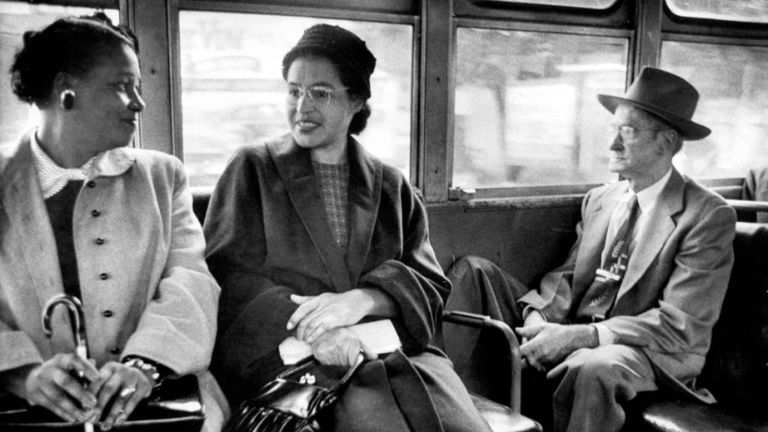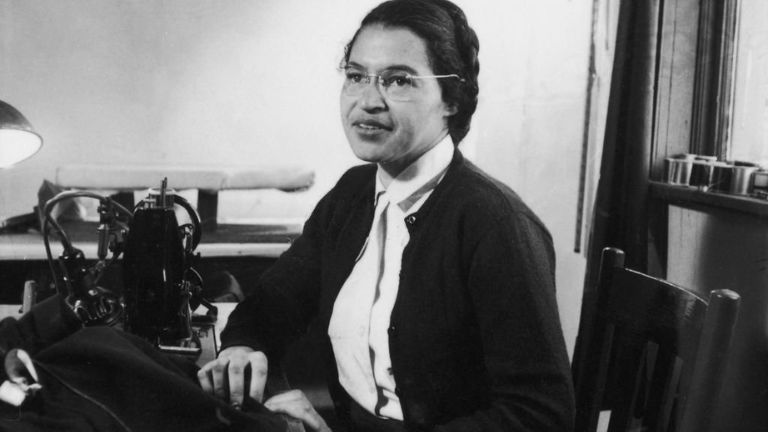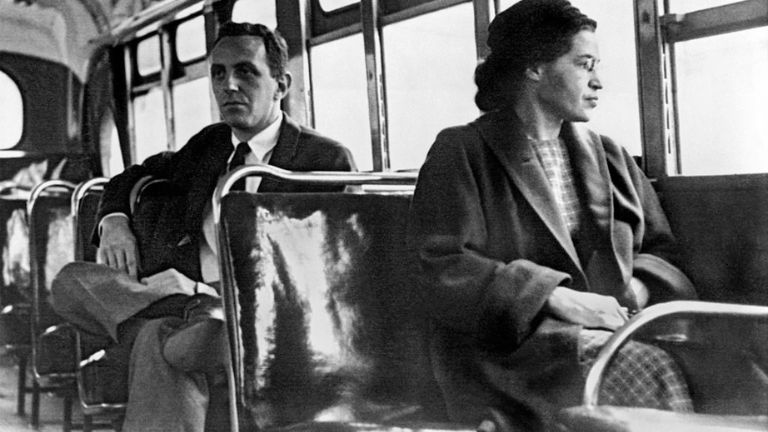Rosa Parks is known as the mother of the civil rights movement, a courageous woman who refused to give up her seat to a white man on a Montgomery, Alabama bus in 1955. This act of civil disobedience triggered a series of events that led to the end of segregation on Montgomery’s public transport system and inspired the civil rights movement across the country.
However, Rosa Parks ‘ story is not limited to this iconic event. She was a long-time civil rights activist and a key figure in the Montgomery movement before the bus incident. In this article, we’ll explore Rosa Parks’ life, her commitment to justice and her lasting impact on civil rights history.

Rosa Parks’ youth and education
Rosa Parks was born on February 4, 1913 in Tuskegee, Alabama, into a modest family of farm workers. She was the daughter of James McCauley and Leona Edwards, who separated while she was still a child. She grew up in Montgomery, where she was raised mainly by her mother and maternal grandmother, strong, committed women who had a great influence on her.

Rosa Parks attended public school in Montgomery, where she was confronted with racial segregation and injustice from an early age. Despite her talent for learning, she left school at the age of 16 to care for her ailing grandmother and mother. She worked as a seamstress in several Montgomery stores to help support her family.
Despite her lack of formal education, Rosa Parks was an avid reader and eager for knowledge. She learned about politics, social justice and liberation movements by reading newspapers and books. She was particularly interested in the writings of Marcus Garvey, a black Jamaican leader who advocated nationalism and black emancipation, as well as those of W. E. B. Du Bois, a black American sociologist and activist who was an advocate of equal rights.

Rosa Parks also attended meetings of local activists to discuss issues of concern to them, such as the fight against segregation in schools and on public transport. It was in this context that she met and worked with leading activists such as E. D. Nixon, president of the local branch of the NAACP (National Association for the Advancement of Colored People), and Jo Ann Robinson, a member of the Women’s Political Council, a black women’s organization in Montgomery.
Her commitment to social justice
Rosa Parks’ commitment to social justice began long before her act of civil disobedience in 1955. In fact, Parks had been active in the fight against racial discrimination and police violence for many years.
In 1943, Rosa Parks began working for the NAACP (National Association for the Advancement of Colored People) as secretary to the president of the Montgomery branch. She worked on racial discrimination cases, including violence against blacks, employment discrimination suits and police violence. She also worked to improve living conditions for blacks in Montgomery, including organizing fundraisers to support NAACP activities.

In 1944, Rosa Parks was put in charge of the investigation into the rape of Recy Taylor, a black woman who had been assaulted by six white men on her way home from church. Rosa Parks and the NAACP worked to raise awareness of the case and succeeded in obtaining an investigation by the Governor of Alabama and the U.S. Department of Justice. Although the assailants were never convicted, Recy Taylor’s case brought national attention to sexual violence against black women and became a catalyst for the civil rights movement.
The Montgomery Bus Boycott
On December 1, 1955, Rosa Parks boarded a Montgomery City Lines bus number 2857 after a day’s work. The bus was full of white passengers, and when Rosa Parks refused to give up her seat to a white man, she was arrested for violating segregation laws in force in transportation

The following day, civil rights activists met to discuss what to do in response to Parks’ arrest. They decided to launch a boycott of Montgomery buses, calling on blacks not to use the city’s public transportation until segregation was abolished. The boycott began the next day and lasted over a year, until the U.S. Supreme Court issued a ruling declaring segregation on public transport unconstitutional.
Rosa Parks played an important role in organizing the boycott. She worked with other activists to create alternative transportation systems for blacks, including carpools and cab services. She also spoke at rallies and helped organize demonstrations.

The Montgomery bus boycott was a major turning point in the civil rights movement. It showed that black people were willing to fight for their rights and inspired other boycott movements across the country. Rosa Parks became a national figure and a symbol of non-violent resistance.
Rosa Parks’ legacy and impact
Rosa Parks continued to work for civil rights throughout her life. She moved to Detroit in 1957 with her husband, Raymond Parks, and worked for Congressman John Conyers for over 20 years. She also co-founded the Rosa and Raymond Parks Institute for Education and Research, which works to promote the civil rights legacy and combat poverty and racial discrimination.
Rosa Parks died on October 24, 2005 at the age of 92. She received many honors throughout her life, including the Presidential Medal of Freedom in 1996, the United States’ highest civilian honor.
Parks’ legacy is immense. She inspired generations of civil rights activists and helped advance the struggle for racial equality in the United States. She was a pioneer of non-violent civil disobedience, a tactic that was adopted by other civil rights activists, including Martin Luther King Jr.

In addition to her contribution to the struggle for civil rights, Rosa Parks also inspired social movements in other fields. She became a symbol of resistance to injustice, a figure who inspired movements for gender equality, LGBTQ movements and environmental movements, among others.
Rosa Parks’ story is a source of inspiration for people all over the world. Her courage and determination paved the way for significant change in American society and inspired social movements around the world. Her legacy is an inspiration to activists fighting for equality and social justice today, and will continue to inspire future generations.
Here are 5 quotes from Rosa Parks:
1 – « I didn’t want to be at the mercy of luck. I wanted to be able to control my destiny. »
2 – « I learned that when human dignity is at stake, you must never give in. »
3 – « I believe that we are here in this world to live, to grow and to face all challenges with courage and with faith in God who loves us and keeps us. »
4 – « Each of us must have an anchor, a place where we can go in times of despair. For me, that place is prayer. »
5 – « I have not been racially discriminated against once. I’ve been a victim of racial discrimination all my life. It’s enough now. »
Read also our article : Marcus Garvey









